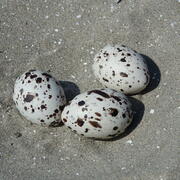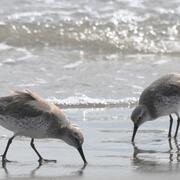Threatened and Endangered
Threatened and Endangered
Filter Total Items: 58
Evaluating Efficacy of Stewardship Actions for Vulnerable Gulf of America Coastal Birds Through Co-Production Between Scientists and Resource Managers
The USGS and partners will survey bird and human activity on beaches in Alabama, Mississippi, and Louisiana to determine breeding bird response to stewardship activities aimed at protecting and recovering bird populations.
Winter Shorebird Surveys of Federally Protected Bird Species Following Restoration at West Belle Headland and Trinity-East Island, Louisiana
The USGS and the Barataria-Terrebonne National Estuary Program (BTNEP) conducted post-restoration monitoring of Piping Plovers and Red Knots to better understand how birds respond to coastal restoration.
Tracking Non-breeding Habitat Use by Dunlin, Pectoral Sandpipers, and Other Migratory Shorebirds in the Mississippi Delta
USGS researchers and heir partners are capturing and banding birds that use man-made habitats to gather data on species occurrence, abundance, and energetic condition during autumn migration.
Population Ecology of Florida Manatees
USGS is working with partners to understand how the federally protected Florida manatee ( Trichechus manatus latirostris) population changes over time and responds to threats.
Manatee Health Assessment and Biomedical Studies
A multi-agency effort assesses the health of manatees and provides baseline information on their health, reproductive status, and nutritional condition.
Avifauna Surveys of the Northern Main Chandeleur Islands
USGS WARC ecologists are assisting partners in conducting avian surveys on Chandeleur Islands during the pre-restoration monitoring phase to document threatened and endangered species, species richness and diversity, species abundance, and habitat use.
Monitoring Effects of Barrier Island Restoration on Piping Plovers in Louisiana
The federally threatened piping plover relies on sand-beach habitat year-round for nesting, foraging, and roosting, habitat that is particularly vulnerable to loss and degradation from coastal development, recreation activities, erosion, and sea-level rise.
Distribution and Density of Sea Turtles in the Gulf: Gulf of America Marine Assessment Program for Protected Species (GoAMAPPS)
The over-arching goal of GoAMAPPS is to collect broad-scale survey data for seabirds, marine mammals and sea turtles to determine distribution and abundance in the Gulf.
Sturgeon Occurrence and Behavior in the Outer Continental Shelf
A new study aims to collect information on sturgeon temporal and spatial distribution to inform offshore wind energy and sand leasing operations.
Gulf Sturgeon Ecological Investigations
The Gulf sturgeon, Acipenser oxyrinchus desotoi, has been listed as Threatened since 1991. Beginning in 1986, USGS has been investigating sturgeon population abundance and ecology throughout its range, but mostly in the Suwannee River.
Natural Resource Damage and Assessment (NRDA) Program-Louisiana’s Monitoring and Adaptive Management
The USGS is participating in the Louisiana-Trustee Implementation Group Monitoring and Adaptive Management work group to assess the injuries caused by the Deepwater Horizon oil spill and to select the appropriate restoration measures to compensate the public for the injury to coastal and marine resources.
Fine-Scale Dive Profiles and Activity Patterns of Sea Turtles in the Gulf
Researchers are developing acceleration data logger pop-off packages that can be affixed to sea turtles to collect behavioral patterns of diving, surfacing, and general activity levels.













